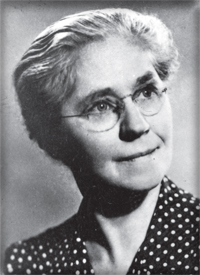Page Content
 When the Alberta Teachers’ Association awarded an honorary membership to Donalda Dickie in 1961, it recognized an extraordinary woman’s 60 years of service to education. Dickie had earlier won the Governor General’s Award for juvenile literature (1950) and received an honorary doctorate from the University of Toronto (1952).
When the Alberta Teachers’ Association awarded an honorary membership to Donalda Dickie in 1961, it recognized an extraordinary woman’s 60 years of service to education. Dickie had earlier won the Governor General’s Award for juvenile literature (1950) and received an honorary doctorate from the University of Toronto (1952).
Dickie claimed to be “just a teacher,” but she was an influential educator. The intersection of her life with Alberta’s early days reminds us how important teachers and public education are in building strong, socially conscious societies.
Born in Ontario in 1883 and orphaned early, Dickie migrated west with her grandmother, to Moose Jaw, Saskatchewan. In 1901, she attended the Regina Normal School, with H. C. Newland, who also had an illustrious career as ATA president (1920–22), as the first editor of the ATA Magazine and as a leader in educational reform in Alberta. Newland. Dickie taught in a rural school for two years and then attended Queen’s University (with William Aberhart, who became Alberta’s premier in 1935). She won gold medals in history and English, and in 1910 was granted the advanced MA.
Someone in Alberta recognized Dickie’s talents, and she was recruited to work in the Calgary Normal School. In 1912, she helped set up the Camrose Normal School, and over the next 30 years she taught in each of Alberta’s normal schools, preparing elementary school teachers in various subjects. She was respected by her students and extolled for her sense of humour. A poem in the 1924/25 Calgary Normal School yearbook talks about Dickie as a strict teacher but goes on to say:
Who calls us all children dear?
Whose voice is it we love to hear?
To us it seems, ah, very clear.
Miss D.
After continuing her education at Columbia University and the University of Oxford, Dickie earned a PhD in history from the University of Toronto in 1930. This made her one of Canada’s best-educated normal school instructors.
Dickie was also a textbook author. While teaching, she realized that the history texts used in schools were “literally incomprehensible” for young readers. She produced eight student-friendly readers for elementary schools. Soon, she was writing textbooks in various subjects, producing more than 60 over her lifetime.
Textbooks shape what teachers teach and what students learn. The popularity of Dickie’s books gave her interpretation of the world a special legitimacy. She encouraged tolerance through her appreciation of diversity, multiculturalism and the strengths of Canada’s Aboriginal population. She promoted community values and argued that a nation should look after its weak and poor. Through her writing for children, Dickie helped form the Canadian identity.
In the 1930s, Dickie established Alberta as a leader in child-centred, activity-oriented education. She wrote a teacher education textbook, and as D. J. Oviatt (a Department of Education colleague) observed, she “did more than any other single person to make the implementation of the activity movement in Alberta education a reality.”
This glimpse into the life of Donalda Dickie does not do justice to her contributions, which also included developing readers featuring Aboriginal children as protagonists (an early example of inclusive curriculum materials), editing a children’s magazine and writing delightful children’s fiction. Dickie’s leadership in education in Alberta made her an exemplar. She deserves to be remembered.
This is an abridged version of an article by Rebecca Priegert Coulter that originally appeared in the ATA Magazine 86:2 (2005). Her article “Getting Things Done: Donalda Dickie and Leadership Through Practice” appeared in the Canadian Journal of Education 29 (2006).
